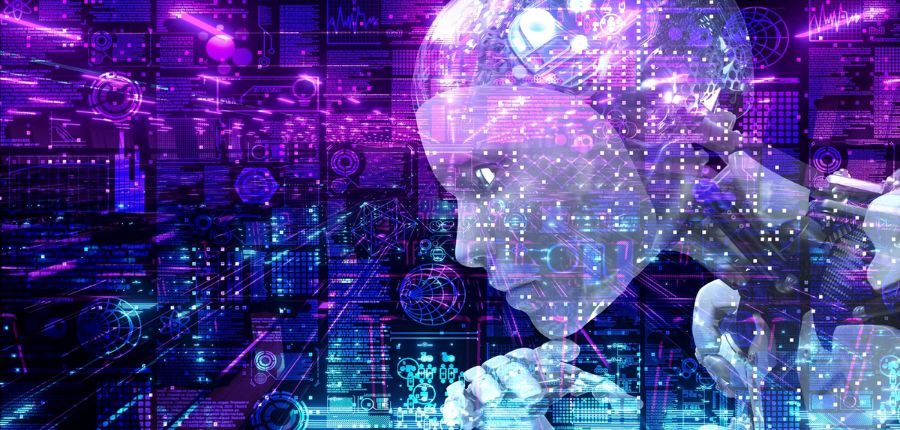What is Artificial Intelligence (AI) and How It's Helping Businesses Grow

Artificial Intelligence (AI) is revolutionizing the way businesses operate. It is a form of technology that enables machines to learn from experience, adjust to new inputs, and perform tasks that normally require human intelligence. AI is quickly becoming the foundation of many business operations and is helping businesses increase their productivity, efficiency, and success. In this blog post, we will discuss the basics of AI and how it is helping businesses grow.
What is Artificial Intelligence?
Artificial Intelligence, commonly referred to as AI, is the ability of a computer or machine to perform cognitive functions such as learning, problem-solving, and pattern recognition. AI is based on the idea that machines can be programmed to ‘think’ like humans do, and act accordingly. AI systems are designed to work and react in ways similar to a human brain, which allows them to make decisions independently of human input.
AI technology has been around since the 1950s, but it has only recently become a major part of the way businesses operate. AI is being used to automate processes and make more efficient decisions, while providing better customer experiences.
At its core, AI relies on algorithms and statistical models to solve complex problems and generate data-driven insights. Machine learning, a subset of AI, uses algorithms to train computers to recognize patterns in data and adapt to changing environments. This allows AI systems to learn from experience and make decisions based on the data they’re presented with.
The most common types of AI include Natural Language Processing (NLP), Image Recognition, Machine Learning, Robotics, and Deep Learning. Each type of AI has its own unique applications and benefits for businesses.
For example, NLP is used for automated customer service agents, image recognition for facial recognition systems and fraud detection, robotics for autonomous vehicles and drones, and deep learning for predictive analytics.
By using AI, businesses can make more informed decisions faster than ever before and take advantage of opportunities faster than their competitors.
Benefits of AI:
The use of Artificial Intelligence (AI) offers businesses a wide range of benefits, from increased efficiency to improved customer service. AI technology is capable of analyzing large amounts of data in a short amount of time, giving businesses insight into patterns and trends that would otherwise remain hidden. This data can then be used to develop better products, services, and strategies.
AI can also provide valuable insights into customer behavior and preferences. By leveraging AI technology, businesses can understand customer preferences and make informed decisions about how best to target their marketing campaigns. As AI technology becomes more sophisticated, companies can use it to tailor their offerings to the exact needs of their customers.
AI also enables businesses to automate many processes, reducing the amount of time spent on mundane tasks and freeing up resources to focus on more important areas. Automation also reduces the chances of human error and increases accuracy, both of which can improve efficiency and increase customer satisfaction.
Finally, AI helps businesses identify new opportunities and areas of growth. By using predictive analytics, businesses can gain insight into future trends, making it easier to make informed decisions about investments and other business-related decisions. This can help businesses stay ahead of the competition and stay profitable.
Future of AI:
The potential applications of Artificial Intelligence (AI) are seemingly limitless and the future of AI is incredibly exciting. From automating mundane tasks to helping us unlock the mysteries of our universe, the possibilities for AI-driven advancements in science and technology are incredible. We can only imagine what kind of breakthroughs may be achieved with AI in the coming years.
AI is being used in a variety of ways to improve efficiency, accuracy and productivity across a broad range of industries. In the healthcare industry, AI is being used to diagnose and treat diseases more accurately than ever before. In the retail sector, AI has enabled companies to process orders faster and with fewer errors. In the automotive industry, AI is being used to create self-driving vehicles. The list goes on and on.
At this point, it’s difficult to predict exactly how AI will be used in the future, but there’s no doubt that it’s here to stay. As technology continues to advance, AI will become more sophisticated and capable of performing increasingly complex tasks. In the near future, we may see AI being used to identify and prevent potential security threats, automate repetitive or labor-intensive tasks, and even create entirely new products or services.
There is also potential for AI to help humans in other ways. For instance, AI could be used to improve medical diagnostics and treatment, as well as better understand human behavior. AI could also be used to improve customer service by responding to inquiries more quickly and accurately than humans could.
In short, the future of AI is very bright. With its potential to automate mundane tasks, improve efficiency, increase accuracy and productivity, and even revolutionize the way we do business, there’s no telling what amazing things AI will achieve in the years ahead.




No comments